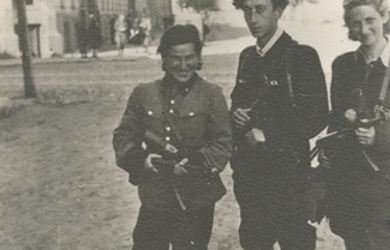 Rozka Korchak was born to a downtrodden, traditional Jewish Zionist family, the eldest of three. She went to both a Polish school and a Jewish Cheder to learn Yiddish, where she was the only female student. Her family’s economic hardships prevented the continuation of her formal studies. She continued to study various things at the local library, whilst employed selling baked goods from the home of a Jewish widow from a nearby town, Plock. There, she joined the local branch of Hashomer Hatzair, work that she continued in Vilnius.
Rozka Korchak was born to a downtrodden, traditional Jewish Zionist family, the eldest of three. She went to both a Polish school and a Jewish Cheder to learn Yiddish, where she was the only female student. Her family’s economic hardships prevented the continuation of her formal studies. She continued to study various things at the local library, whilst employed selling baked goods from the home of a Jewish widow from a nearby town, Plock. There, she joined the local branch of Hashomer Hatzair, work that she continued in Vilnius.
Korchak emerged as a major figure in the United Partisans Organisation (FPO), an underground resistance movement in the ghetto. During the liquidation of the ghetto in September 1943, she and a troop of FPO members managed to escape to the Rudniki Forest near Vilna, where they joined the Partisans in the forest until the end of the war.
At the end of 1944, Korchak immigrated to Palestine and was one of the first to deliver first-hand testimony of the Holocaust in Vilna, and the story of the Jewish resistance. She joined Kibbutz Ein Hahoresh and was one of the founders of Moreshset, the Mordechai Anielewicz Memorial Holocaust Studies and Research Centre. She continued to devote her life to commemorating the Holocaust and Jewish resistance.